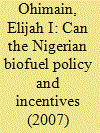| Srl | Item |
| 1 |
ID:
118850


|
|
|
|
|
| Publication |
2013.
|
| Summary/Abstract |
Nigeria's economy is largely dependent on petroleum, yet the country is suffering from fuel supply shortages. In response to the transportation fuel supply difficulties in Nigeria, the country released the Nigerian Biofuel Policy and Incentives in 2007 to create favorable investment climate for the entrance of Nigeria into the biofuel sector. The paper assessed the progress made thus far by Nigeria, 4 years after the Nigerian biofuel was released in an attempt to answer the question whether the policy is adequate to transform Nigeria into a biofuel economy. The study found that little progress has been made, which includes commencement of the construction of 20 bioethanol factories, installation of biofuel handling facilities at two depots (Mosimi and Atlas Cove), and selection of retail outlets for biofuel/conventional fuel mix. The site construction of the announced biofuel projects is now slow and other progress is marginal. We therefore conclude that the Nigerian biofuel policy is unlikely to transform Nigeria into a biofuel economy unless the Government revert and refocus on biofuel and include additional financial incentives such as grants and subsidy to complement the tax waivers (income, import duty, VAT), loans, and insurance cover contained in the policy.
|
|
|
|
|
|
|
|
|
|
|
|
|
|
|
|
| 2 |
ID:
099338


|
|
|
|
|
| Publication |
2010.
|
| Summary/Abstract |
Despite being a major petroleum producing and exporting country, Nigeria has for a long time imported refined petroleum products for domestic consumption. The country has recently made an entrance into the bio-energy sector by seeding the market with imported ethanol until enough capability exists for the domestic production of ethanol. The Nigerian Biofuel Policy was released in 2007 calling for the domestic production of bio-ethanol to meet the national demand of 5.14 billion litres/year. Some investors have responded by investing over $3.86 billion for the construction of 19 ethanol bio-refineries, 10,000 units of mini-refineries and feedstock plantations for the production of over 2.66 billion litres of fuel grade ethanol per annum. Also, another 14 new projects are in the offing. Of the 20 pioneer projects, 4 are at the conception phase, 8 are in the planning phase, and 7 are under construction with only 1 operational. The potential benefits of the emerging bio-ethanol projects include investment in the economy, employment, energy security and boost rural infrastructure, while the major challenge is land take (859,561 ha). This is the first time an attempt is been made to document the emerging bio-ethanol projects in Nigeria.
|
|
|
|
|
|
|
|
|
|
|
|
|
|
|
|